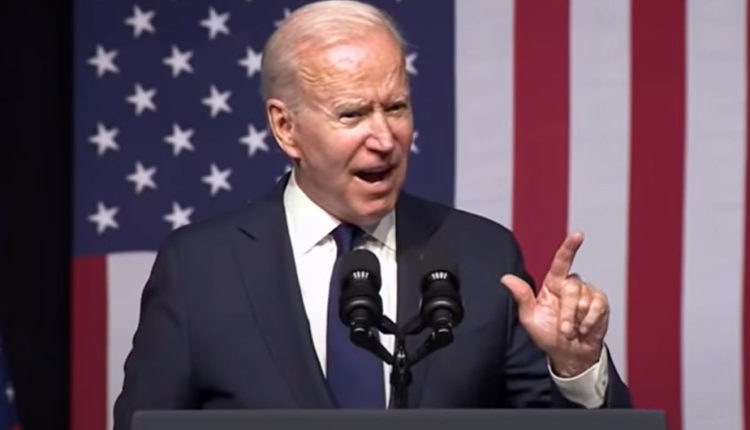Wow. Biden’s last few days in office have been taking a lot out of him. He is giving major grumpy cat vibes.
Don’t take my word for it.
Watch:
He also made waves with his Medal of Honor Ceremony.
Read the full White House transcript here:
5:18 P.M. EST
THE PRESIDENT: Please be seated. Thank you. Ladies and gentlemen, as commander in chief, this is the most solemn occasion that I participate in in my four years every time we do this event.
Secretary Austin, Secretary Wormuth, Chairman Brown — General, it’s good to see you — Representative Case, Castro, Ryan, and Takano, and, most importantly, veterans, service members, and previous Medal of Honor recipients: Today is the final time as commander in chief and I’m deeply privileged to honor seven American — seven American heroes. And that’s not hyperbole. These are genuine to their core heroes.
Heroes of different ranks, different positions, and even different generations. But heroes who all went above and beyond the call of duty. Heroes who all deserve our nation’s highest and oldest military recognition: the Medal of Honor.
First Private Bruno Orig. A proud son of Hawaii, Bruno joined the Army when he was just 19 years old. Less than one year later, he was completing a mission in Korea. Bruno saw his fellow soldiers were wounded and stranded under enemy fire. Without hesitation, he ran out to rescue them, giving his own life to save the lives of his brothers-in-arms. That’s valor. That’s the definition of valor.
Private First Class — you know, I think it’s incredible when I think of the men and women who have done — who have gotten this award — but Private First Class Wataru Nakamura. After an attack on Pearl Harbor, he was forced to live in an internment camp, like so many other Japanese-Americans — like my good friend Danny Inouye, who was a hero himself — put in an internment camp.
But still, he signed up to serve our nation during World War II and the Korean War. During his last mission in May of 1951, single-handedly, he defended his unit from enemy attack, fighting until he was killed by a grenade.
Corporal Fred McGee. A Midwesterner, a steelworker, and a gunner in one of the first integrated Army units of the Korean War. Fred embodied the very best of our country. In June 1952, his unit was attacked. They took casualties. They were ordered to fall back. But Fred refused — refused to leave until he helped every wounded soldier evacuate.
Private First Class Charlie Johnson. Growing up, in the words of one of Charlie’s high school classmate, “He was a heck of a football player.” Well, back in 1952, Charlie signed up to serve in Korea, trading his jersey for a uniform. During one battle, he gave his life to defend a bunker full of his wounded soldiers. His valor saved 10 men, including an old high school classmate.
General Richard Ca- — excuse me — excuse me — Cavazos. A young first lieutenant in Korea, Richard led his men through a difficult and deadly mission in enemy territory. Eventually, he was ordered to retreat, but he stayed. He stayed, rescuing wounded soldiers one by one until every one of them was evacuated. Richard went on to serve for three decades in the Army, becoming the first — the country’s first Hispanic four-star general.
And Captain Hugh Nelson. A Citadel graduate, helicopter pilot, and a proud young father. He was just 28 years old when he and his crew were shot down in Vietnam. Hugh freed his men who were trapped in the wreckage. Then, as the enemy began to attack, he used his body as a shield to protect them. It cost him dearly. It cost him his life. Hugh’s commanding officer called it the “ultimate act of self-sacrifice,” which it was.
And finally, Private First Class Ken David, who is here with us today. Nearly 55 years ago, in Vietnam, his company was ambushed by the enemy. Ken’s lieutenant was killed instantly. Then, Ken himself was hit in the back by shrapnel. But he couldn’t and wouldn’t give up. Instead, he shouted and fired his weapon attacking — to attract attention to him, away from others and away from the wounded men. Imagine that courage. “Come get me. Come get me. Don’t get those folks.” That’s selflessness.
Ken, I want to say to you that I wish I could say to every man we’re honoring today: You’re a hero. A genuine hero. A flat-out, straight-up American hero. And we owe you and the families owe you.
Let me close with this. I said ear- — as I said earlier, these are my final days as commander in chief. It’s been the greatest honor of my life to be entrusted with the greatest fighting force in the history of the world. They’re the finest military in the history of the world. And every day — every day their integrity, their patriotism, and their courage.
And to learn the stories of Americans like Bruno and Wataru and Fred and Charlie and Richard and Hugh, Ken. Americans who have not only fought for our nation but embodied the very best our nation has to offer.
Let me also say this. Today, we award these individuals the Medal of Honor. But we can’t stop there. Together, as a nation, it’s up to us to give this medal meaning. To keep fighting — to keep fighting for one another, for each other; to keep defending everything these heroes fought for and many of them died for — the ideals of America, the freedoms we cherish, the democracy that has made our progress possible.
And remember, we are the only nation in the world built on an idea. Every other nation is built based on geography, ethnicity, or religion. But we are the only nation based on an idea.
The idea is that we hold these truths evident — sel- — to be self-evident. All men and women are created equal and deserve to be treated equally throughout their entire lives. We haven’t always lived up to it, but we’ve never, ever, ever walked away from it.
Today, we must say clearly: We never, ever, ever will.
Now it’s my great an- — honor to ask Lieutenant Colonel Anthony Lichi — excuse me — Lichi the Medal of Honor — to read the Medal of Honor citations.
And thank you all for being here. And God bless you. And may God also protect our troops who are still engaged. Thank you. (Applause.)
MILITARY AIDE: Loretta Orig, accepting on behalf of her brother, Private Bruno Orig.
Attention to orders. The president of the United States of America, authorized by Act of Congress March 3rd, 1863, has posthumously awarded, in the name of Congress, the Medal of Honor to Private Bruno R. Orig, United States Army, for conspicuous gallantry and intrepidity at the risk of his life above and beyond the call of duty.
Private Bruno R. Orig distinguished himself by acts of gallantry and intrepidity above and beyond the call of duty while serving with Company G 23rd Infantry Regiment, Second Infantry Division in the vicinity of Chipyong-ni, Korea, on February 15th, 1951.
While returning from a wire-laying mission, Private Orig observed a number of his comrades who had been wounded in a fierce enemy attack that was still in progress. With complete disregard for his own safety, Private Orig went to the aid of these men and remained in an exposed position in order to administer first aid to them. With the assistance of several comrades from the company command post, Private Orig began removing the wounded to a place of safety. While returning from one of these trips, Private Orig noticed that all except one man of a machine gun crew had been wounded.
Without hesitation, he volunteered to man the weapon. Remaining in this position, Private Orig placed such effective fire on the enemy that a withdrawing friendly platoon was able to move back without a single casualty. Private Orig continued to inflict heavy casualties on the enemy until the company positions were overrun.
Later that day, when the lost ground was recaptured, Private Orig was found dead beside his weapon, and the area in front of his gun was littered with enemy dead. Private Orig’s extraordinary heroism and selflessness above and beyond the call of duty were in keeping with the highest traditions of military service and reflect great credit upon himself, his unit, and the United States Army.
(The Medal of Honor is presented.) (Applause.)
Gary Takashima, accepting, on behalf of his uncle, Private First Class Wataru Nakamura.
Attention to orders. The president of the United States of America, authorized by Act of Congress March 3rd, 1863, has posthumously awarded, in the name of Congress, the Medal of Honor to Private First Class Wataru Nakamura, United States Army, for conspicuous gallantry and intrepidity at the risk of his life above and beyond the call of duty.
Private First Class Wataru Nakamura distinguished himself by acts of gallantry and intrepidity above and beyond the call of duty while serving with Company I, 38th Infantry Regiment, Second Infantry Division, in the vicinity of P’ungch’on-ni, Korea, on May 18th, 1951.
At about daybreak of that date, Private First Class Nakamura volunteered to check and repair a communications line between his platoon and the command post. As he made his way along the line in the early morning half-light, he was brought under fire by an enemy force that had surrounded friendly positions and were threatening to break the company defense lines.
Immediately, without regard for his own safety and without waiting for help, Private First Class Nakamura rushed the enemy with fixed bayonet engaged. Single-handedly, he attacked and destroyed a hostile machine gun nest and drove the enemy from several of the bunkers they had captured. When his ammunition was depleted, he withdrew under intense enemy fire.
Then he met an ammunition party ascending the hill. Quickly briefing the officer in charge, Private First Class Nakamura rearmed himself and, covered by the fire of the officer and two comrades, returned to the attack. In a fierce charge, he killed three of the enemy in one bunker and killed and seriously wounded another in the last enemy-held bunker.
Continuing to press the attack, he fell, mortally wounded by an enemy grenade. Private First Class Nakamura’s extraordinary heroism and selflessness above and beyond the call of duty were in keeping with the highest traditions of military service and reflect great credit upon himself, his unit, and the United States Army.
(The Medal of Honor is presented.) (Applause.)
Victoria Secrest, accepting on behalf of her father, Corporal Fred McGee.
Attention to orders. The president of the United States of America, authorized by Act of Congress, March 3rd, 1863, has posthumously awarded, in the name of Congress, the Medal of Honor to Corporal Fred B. McGee, United States Army, for conspicuous gallantry and intrepidity at the risk of his life above and beyond the call of duty.
Corporal Fred B. McGee distinguished himself by gallantry in action near Tang-Wan-Ni, Korea, on June 16th, 1952, in an assault on enemy-fortified positions. As gunner on a light machine gun in a weapons squad, Corporal McGee delivered a heavy volume of supporting fire from an exposed position, despite intense enemy machine gun and mortar fire directly on his location.
Though forced to move his gun several times, he continued to support the assault and give covering fire to the assault elements of his platoon. When his squad leader was wounded, together with several other members of his squad, he assumed command and moved the squad even farther forward to a more exposed position in order to deliver neutralizing fire on an enemy machine gun sweeping the other assault platoon with deadly flanking fire.
When his machine gunner was mortally wounded, he again took over the gun. On order, he directed his squad to withdraw and voluntarily remained behind to help evacuate the wounded and dead.
Though wounded in the face, he heroically exposed himself by standing straight up in intense enemy machine gun and mortar fire while attempting to evacuate the body of the company runner. Forced to abandon the body, he aided a wounded man to be moved to the rear and safely through a huge volume of enemy mortar and artillery fire.
The gallantry displayed by Corporal McGee reflects great credit upon himself and is in keeping with the highest traditions of military service.
(The Medal of Honor is presented.) (Applause.)
Dr. Juanita Mendez, accepting on behalf of her brother, Private First Class Charles Johnson.
(Dr. Mendez kisses the president on the cheek.) (Laughter.)
THE PRESIDENT: (Inaudible.) (Laughter.)
MILITARY AIDE: Attention to orders. The president of the United States of America, authorized by Act of Congress, March 3rd, 1863, has posthumously awarded in the name of Congress the Medal of Honor to Private First Class Charles R. Johnson, United States Army, for conspicuous gallantry and intrepidity at the risk of his life above and beyond the call of duty.
Private First Class Charles R. Johnson distinguished himself by conspicuous gallantry and intrepidity beyond the call of duty while defending Outpost Harry against overwhelming odds and making the ultimate sacrifice to save the lives of his comrades in the Republic of Korea during the period of June 11th, 1953, to June 12th, 1953.
Private First Class Johnson was serving as a Browning automatic rifleman with Company B, 15th Infantry Regiment, 3rd Infantry Division.
Chinese forces attacked his unit during a massive nighttime assault. During the ensuing battle, overwhelming numbers of Chinese troops assaulted the trenches and bunkers defended by Private First Class Johnson and his squad.
Private First Class Johnson, wounded from a direct artillery hit on his bunker and subsequently from a hand grenade thrown inside the bunker, at the personal disregard for his injuries, administered first aid to those more seriously injured.
Understanding the seriousness of the situation and being under direct fire from the enemy, Private First Class Johnson personally dragged a wounded soldier to the safety of a secure bunker, stopping intermittently to aid injured soldiers and kill several enemy troops in hand-to-hand combat.
Departing the safety of the second bunker, he conducted a search for weapons and ammunition, and then returned to rearm everyone.
Recognizing their untenable situation and disregarding his personal safety, he exited the bunker, placing himself between the enemy and his injured comrades, informing them he would hold off the enemy as best as he could. His brave and selfless efforts were directly attributed to saving the lives of as many as 10 soldiers.
Private First Class Johnson’s extraordinary actions in close combat with the enemy, his unyielding courage and bravery and profound concern for his fellow soldiers are in keeping with the highest traditions of military service and reflect great credit upon himself, his unit, and the United States Army.
(The Medal of Honor is presented.) (Applause.)
Laura Blevins, accepting on behalf of her father, General Richard Cavazos.
Attention to orders. The president of the United States of America, authorized by Act of Congress, March 3rd, 1863 has posthumously awarded in the name of Congress the Medal of Honor to First Lieutenant Richard E. Cavazos, United States Army, for conspicuous gallantry and intrepidity at the risk of his life above and beyond the call of duty.
First Lieutenant Richard E. Cavazos distinguished himself by acts of gallantry and intrepidity above and beyond the call of duty while serving as the company commander, Company E, 2nd Battalion, 65th Infantry Regiment, 3rd Infantry Division on June 14th to 15th, 1953, in the vicinity of Sagimak, Korea.
On the night of June 14th, First Lieutenant Cavazos led his company in a raid on an entrenched enemy outpost, with the mission of destroying the personnel and installation thereon.
During the initial attack, First Lieutenant Cavazos led his men through intense enemy mortar and artillery fire.
Upon entering the trenches, fierce close combat ensued, during which First Lieutenant Cavazos directed heavy fire on the enemy in their positions.
When an extremely intense enemy mortar and artillery barrage hit his position, First Lieutenant Cavazos withdrew the company and regrouped his men.
Twice more, he led his men through intense enemy fire and assaults on the enemy position, destroying vital enemy fortifications and personnel.
During the entire assault, First Lieutenant Cavazos gave effective commands and words of encouragement to his men and, by his personal example and leadership, inspired them to heroic heights of achievement.
When ordered to withdraw his company, First Lieutenant Cavazos complied, but remained alone on the enemy outpost to search for missing men.
Although exposed to enemy fire, First Lieutenant Cavazos located five battle casualties and evacuated each, one by one, to a point on the reversed slope of a nearby hill where they could be safely recovered by friendly forces.
Returning to the battlefield, he found a small group of men who had become separated from the main assaulting force and personally led them to safety.
When informed that there were still men missing, First Lieutenant Cavazos again returned to the scene of the battle where he located and led another small group of men to safety.
First Lieutenant Cavazos then made two more unassisted trips to the battlefield searching for missing soldiers.
Not until he was personally satisfied that the battlefield was cleared on the morning of June 15th did he allow treatment of his own combat wounds sustained during the action.
First Lieutenant Cavazos’s conspicuous gallantry, extraordinary heroism, and intrepidity at the risk of his life above and beyond the call of duty are in keeping with the highest traditions of military service and reflect great credit upon himself, his unit, and the United States Army.
(The Medal of Honor is presented.) (Applause.)
Deborah Nelson McKnight, accepting on behalf of her father, Captain Hugh Nelson.
Attention to orders. The president of the United States of America, authorized by Act of Congress, March 3rd, 1863, has posthumously awarded, in the name of Congress, the Medal of Honor to Captain Hugh Reavis Nelson Jr., United States Army, for conspicuous gallantry and intrepidity at the risk of his life above and beyond the call of duty.
Captain Hugh R. Nelson Jr. distinguished himself by conspicuous gallantry and intrepidity above and intrepidity above and beyond the call of duty while serving as a member of the 114th Aviation Company (Air Mobile Light) on June 5th, 1966, near Moc Hoa, Republic of Vietnam.
Captain Nelson was the acting aircraft commander of an armed Huey helicopter on a search-and-destroy reconnaissance mission when it was struck by a large volume of enemy fire that rendered the aircraft virtually uncontrollable.
With great difficulty, Captain Nelson and the pilot were able to crash-land the aircraft without lateral controls. At some point after the crash, Captain Nelson exited the aircraft and went to the aid of his wounded comrades. Proceeding to the other side of the aircraft, he found his dazed and wounded crew chief still trapped inside. After removing the specialist and placing him on the ground, Captain Nelson climbed into the severely damaged helicopter to assist the door gunner, who was still strapped inside and unable to move.
While Captain Nelson tried to free his comrade, the insurgents engaged the aircraft with a heavy volume of automatic rifle and small-arms fire at a range of approximately 30 feet from the aircraft. Despite the heavy enemy fire, Nelson continued his gallant efforts, freeing the trapped door gunner despite being hit by enemy fire. Upon removing the wounded door gunner from the aircraft, he forced the specialist to the ground and, without regard for his own life, used his body as a shield to cover his comrade from the intense enemy fire. While shielding his comrade, Captain Nelson was hit several times by enemy fire, sacrificing his own life to save the life of his comrade.
His selfless sacrifice allowed his wounded comrade to use a smoke grenade to signal supporting aircraft in the area that there were crash survivors. The supporting aircraft responded immediately, preventing the insurgents from advancing on the downed aircraft and successfully rescuing the three wounded crew members.
Captain Nelson’s conscious decision to sacrifice his own life for that of his comrades saved the lives of his three fellow crew members that fateful day. Captain Nelson’s distinctive accomplishments are in keeping with the highest traditions of military service and reflect great credit upon himself, his unit, and the United States Army.
(The Medal of Honor is presented.) (Applause.)
Specialist Fourth Class Kenneth David.
Attention to orders. The president of the United States of America, authorized by Act of Congress, March 3rd, 1863, has awarded, in the name of Congress, the Medal of Honor to Private First Class Kenneth J. David, United States Army, for conspicuous gallantry and intrepidity at the risk of his life above and beyond the call of duty.
Private First Class Kenneth J. David distinguished himself by acts of gallantry and intrepidity above and beyond the call of duty on May 7th, 1970, while serving as a radio-telephone operator with Company D, 1st Battalion, 506th Infantry, 101st Airborne Division, near Fire Support Base Maureen, Thua Thien Province, Republic of Vietnam.
On this date, Private First Class David’s company came under an intense attack from a large hostile force. The enemy’s ferocious initial assault mortally wounded the company’s platoon leader and resulted in numerous other friendly casualties. Upon the initial assault and without hesitation, Private First Class David handed his radio to his platoon sergeant and moved forward to the defensive perimeter, unleashing a barrage of automatic weapons fire on the enemy. From this location, Private First Class David bitterly resisted all enemy efforts to overrun his position. Realizing the impact of the enemy assault on the wounded, who were being brought to the center of the perimeter, Private First Class David, without regard for his own life, moved to a position outside of the perimeter while continuing to engage the enemy.
Each time the enemy attempted to concentrate its fire on the wounded inside the perimeter, Private First Class David would jump from his position and yell to draw the enemy fire away from his injured comrades and back to himself. Refusing to withdraw in the face of the concentrated enemy fire now directed toward him, he continued to engage the enemy. Although wounded by an exploding satchel charge and running perilously low on ammunition, he tossed hand grenades toward the attackers to effectively counter their fire. The unit’s medic, realizing that Private First Class David had been injured, moved to his position to provide aid, but Private First Class David assured him that he was okay and continued to fight on.
Private First Class David’s courageous and selfless actions continued to draw the enemy fire away from the incoming medevac helicopters, allowing the wounded to be safely evacuated.
After allied reinforcements fought their way to his company’s position, Private First Class David carried a wounded comrade to a sheltered position. He then returned to the contact area and continued to engage the enemy and provide covering fire for the wounded until the enemy broke contact and fled, at which point he too was medically evacuated.
Private First Class David’s conspicuous gallantry, extraordinary heroism, and intrepidity at the risk of his life above and beyond the call of duty are in keeping with the highest traditions of military service and reflect great credit upon himself, his unit, and the United States Army.
(The Medal of Honor is presented.) (Applause.)
5:49 P.M. EST







